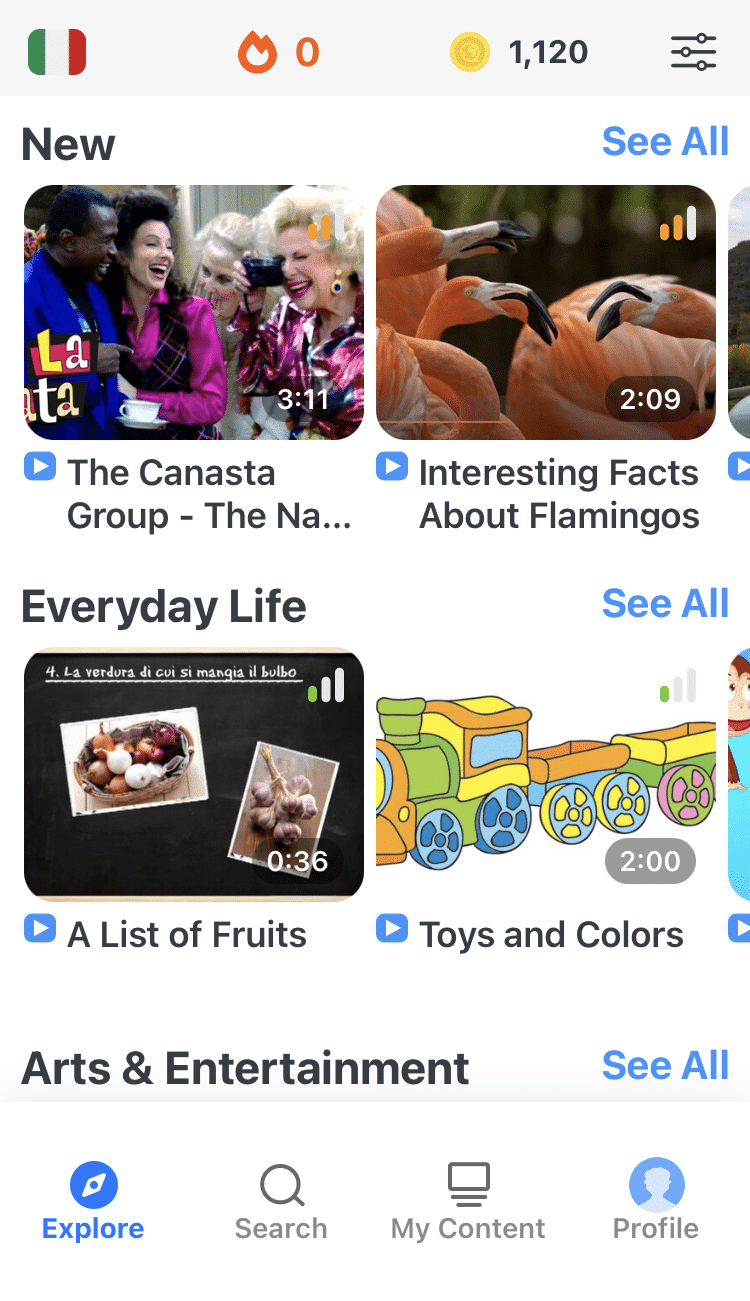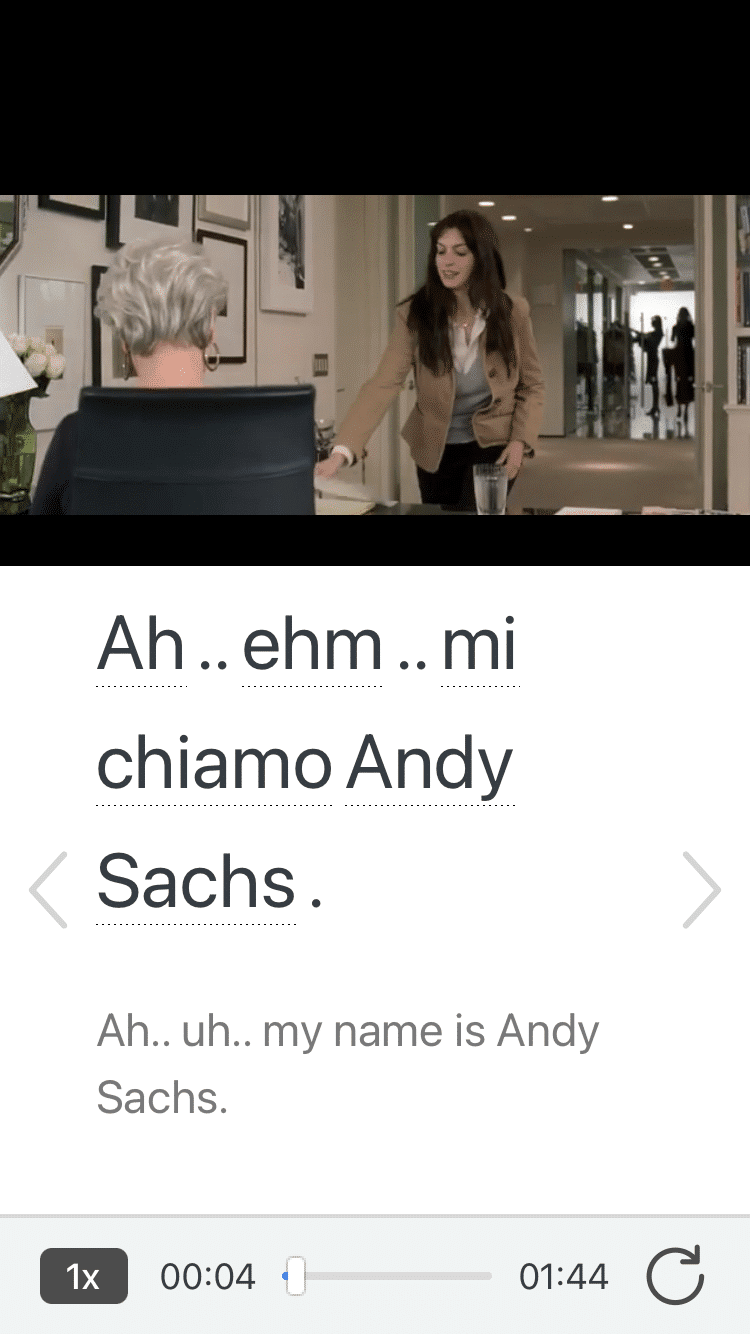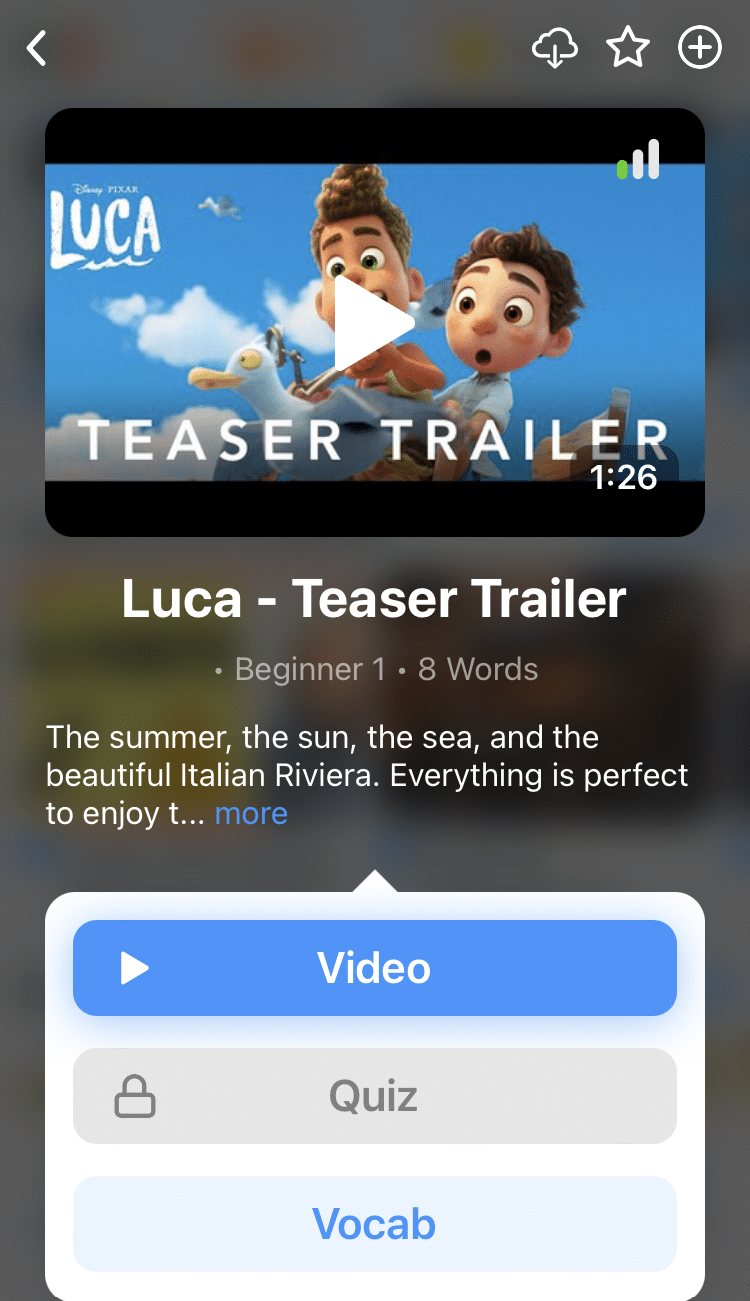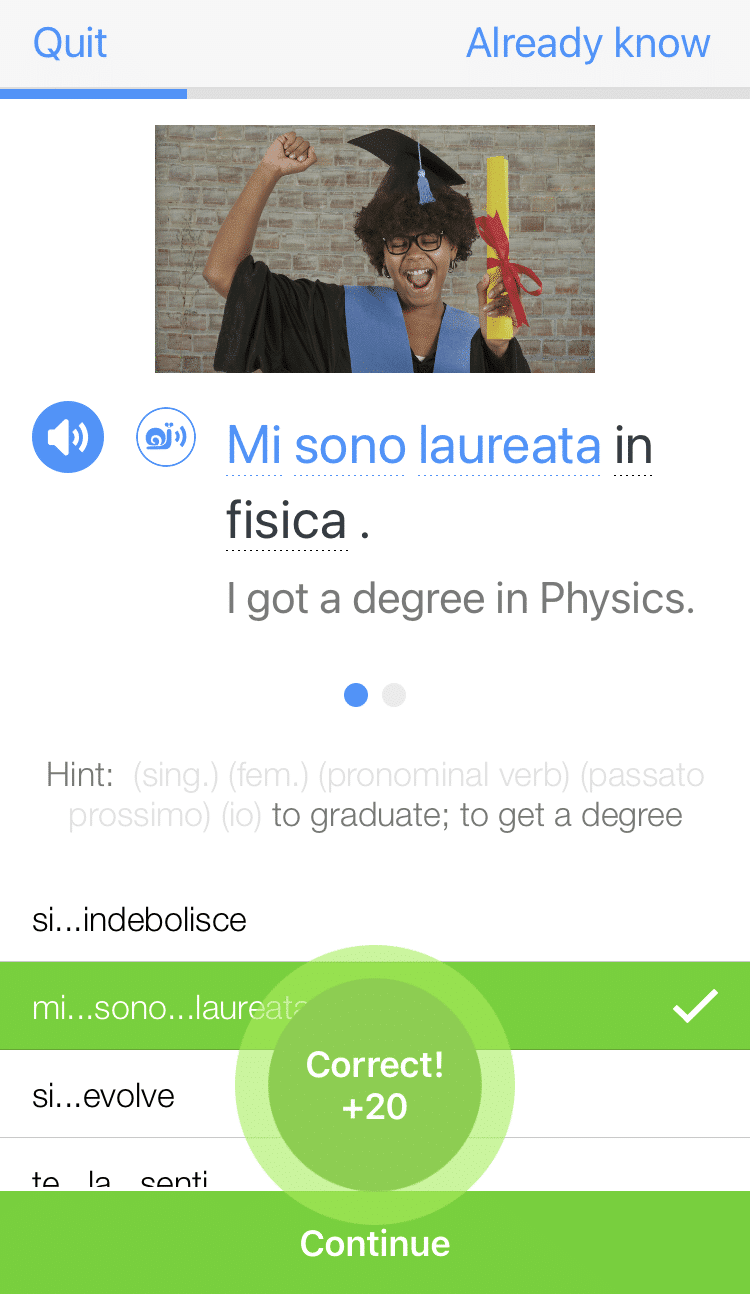
11 Unique Italian Words
There are some words in languages that are so unique that there are no direct translations.
Understanding words that have no literal translation is a great way to gain a deeper knowledge of both the language and the culture that birthed it.
The Italian language has many unique words, such as culaccino, the word for the circular watermark a wet glass leaves on a table.
In this post, we’ll look at 11 untranslatable and unique Italian words you can start using to impress native speakers and spice up your conversations!
Contents
- Apericena (Appetizer Dinner)
- Culaccino (Watermark on a Table)
- Menefreghista (A Person Who Doesn’t Care)
- Gattara (Old Cat Lady)
- Pantofolaio (Couch Potato)
- Struggimento (Literally: Yearning)
- Baffona (Woman with Mustache)
- Magari (Literally: Maybe)
- Boh! (Who Knows?)
- Mozzafiato (Breathtaking)
- Mamma mia! (My Goodness!)
- How to Study the Real Meanings of Italian Words
- And One More Thing...
Download: This blog post is available as a convenient and portable PDF that you can take anywhere. Click here to get a copy. (Download)
Apericena (Appetizer Dinner)
Apericena (appetizer dinner) is the combination of two words you probably already know: aperitivo (appetizer) and cena (dinner).
Italian culture is so influenced by the magnificent food served there, it’s not surprising that the idea of having a buffet-like meal with drinks has become a thing.
If you’re familiar with Spanish culture you’ll recognize this is similar to Spanish tapas (finger food).
However, tapas often preclude a meal whereas apericena basically is the meal.
Culaccino (Watermark on a Table)
There’s no logic to this word but it’s widely used and understood.
A culaccino is the word used to reference a watermark on a table. Not just any watermark, though: It’s the round mark left behind when an ice-filled, sweating, wet glass is placed on a wooden surface—usually a table.
If there’s a random watermark, like a splatter on furniture, it’s unfortunate. But it’s not a culaccino.
Round, in the shape of the bottom of a glass? That’s a culaccino.
Menefreghista (A Person Who Doesn’t Care)
There’s no literal translation for this expression in English. It’s sort of a mashup of the general phrase Non me ne frega (I don’t care).
This word is often used in Italian to refer to someone who, obviously, doesn’t care about whatever’s being discussed or happening at that moment.
For instance, you might be talking to someone about an issue and they are either not particularly interested or they simply brush off any problem. This person could be referred to as a menefreghista.
No one calls themselves this, but it’s tossed around to label others.
Gattara (Old Cat Lady)
In English, we call the elderly woman who either has a ton of felines or feeds a bunch of strays an “old cat lady.”
Italians go one step further and give this concept an actual word: gattara.
It comes from the word gatto (cat). There’s nothing in the word that says “old”; it’s implied. Why? Honestly, I don’t know. That’s what makes it unique!
But if you’re speaking Italian and make reference to a gattara, everyone will understand just exactly what you mean!
Pantofolaio (Couch Potato)
Every culture recognizes the couch potato!
The pantofolaio is the person who’s content to hang around the house in a robe and slippers, never venturing further than the kitchen to grab a snack before settling again on the sofa to binge watch TV shows.
The word comes from pantofole (slippers) and is a fitting adaptation considering couch potatoes rarely leave comfortable trappings, including slippers, behind!
If you tried to translate “couch potato” into Italian, you’d get, literally, patata sul divano (potato on the couch). So, in English you say “couch potato.” In Italian you say pantofolaio.
Struggimento (Literally: Yearning)
This one has a literal translation but it doesn’t come close to the true implication of the word when it’s used.
Yearning is defined as an intense longing for something. Struggimento is all that—but amplified. Like, really amplified.
It’s an intense longing but it shows that the one longing is actually suffering from the intensity of their longing. It implies that the person is absolutely miserable as a result of their yearning.
In other words, it’s a very dramatic word that shows yearning to the point of physical pain.
Baffona (Woman with Mustache)
Baffi (mustache) is the furry creature that men grow on their upper lips. Baffona, however, is a casual term for a woman with a mustache.
This one I learned at a dinner table. Conversation turned to matchmaking and the unmarried man seated near the other end of the table received some well-intentioned news: The neighbor’s daughter was single again.
The man’s reply? È una baffona! (She’s a woman with a mustache!) People nodded and chuckled but no one asked what he meant because they all knew.
No love match was made, but I learned a new word!
Magari (Literally: Maybe)
Magari is a reply to a question that deserves more than an affirmative answer. It implies a definite desire for something, but it’s also non-commital.
It shows that you’d like for something to happen but you’re not exactly sure it will so you wish or yearn for it.
Both forse (maybe) and magari (maybe) can be used interchangeably in conversation although there’s a shade of difference between the two:
Forse (maybe) has an implication of uncertainty; maybe something will happen or maybe it won’t.
Magari (maybe) is more about hopes and wishes.
Boh! (Who Knows?)
Boh is a simple and useful word to add to your Italian vocabulary!
Need something to accompany a shoulder shrug? Or to wave off a question that you don’t want to answer? Or even to comment on whether tomorrow the sun will shine or rain will fall? Boh!
It’s the go-to, use-anytime word that comes so easily and covers so much.
If you’re not sure, can’t be bothered, don’t want to be pinned down or just plain don’t feel like thinking, wave your hand and reply, boh!
Believe me, it works!
Mozzafiato (Breathtaking)
Mozzafiato translates literally but it has an intensity behind it that certainly can’t be translated. There’s an emotional element to the word.
Mozzafiato (breathtaking) comes from a combination of the words mozzare (to cut off) and fiato (breath).
Even though there isn’t a direct translation for mozzafiato, when you look at its root words it does make sense!
If something is so divinely gorgeous that witnessing it steals your breath, it’s mozzafiato.
Mamma mia! (My Goodness!)
It goes everywhere, addresses any situation and is a perfect Italian exclamation for when you don’t know what else to say. It fills nearly every conversational bare spot.
Were you just served the most amazing pasta? Mamma mia! Or perhaps the music at the outdoor concert in the piazza (square) sound amazing? Mamma mia!
Alternatively, if you’re served a terrible meal or go on an awful date? Mamma mia!
You get the idea. If something is wonderful or bad: Mamma mia!
How to Study the Real Meanings of Italian Words
It’s one thing to learn the definition of a word. But it’s entirely different to learn its meaning.
When I began to study Italian, I entered an immersive environment and noticed that certain items had names that were different from those I’d learned from my coursework. There were also expressions that everyone seemed to understand that I definitely didn’t.
So I asked, and in response I got this advice:
Non cercare la logica. Cerca significato. (Don’t look for logic. Look for meaning.)
I now impart this advice onto you!
How do you learn unique Italian words, especially when they have no direct English translation? You look for meaning, and accept that it might be different from the dictionary definition.
The best way to do this is to immerse yourself in the language. Immersive learning is a super way to grasp the intricacies of a language.
If you can’t travel to Italy, you can create an immersive Italian experience in your own home.
FluentU takes authentic videos—like music videos, movie trailers, news and inspiring talks—and turns them into personalized language learning lessons.
You can try FluentU for free for 2 weeks. Check out the website or download the iOS app or Android app.
P.S. Click here to take advantage of our current sale! (Expires at the end of this month.)
Another quick tip to immerse yourself at home is to change the settings on your phone or laptop to Italian. This is what I call “forced immersion”: You give yourself no choice but to use the language! You may struggle at first, but the longer you keep your devices in Italian, the more comfortable it will feel.
With a little effort—and a list like the one we’ve compiled here—we can all grasp these words and use them to impress native speakers!
Expand your vocabulary and start adding some spice to your Italian conversations!
Put these untranslatable and unique Italian words to work and you’ll sound molto autentico (very authentic)!
Buona fortuna! (Good luck!)
Download: This blog post is available as a convenient and portable PDF that you can take anywhere. Click here to get a copy. (Download)
And One More Thing...
If you're as busy as most of us, you don't always have time for lengthy language lessons. The solution? FluentU!
Learn Italian with funny commericals, documentary excerpts and web series, as you can see here:

FluentU helps you get comfortable with everyday Italian by combining all the benefits of complete immersion and native-level conversations with interactive subtitles. Tap on any word to instantly see an image, in-context definition, example sentences and other videos in which the word is used.

Access a complete interactive transcript of every video under the Dialogue tab, and review words and phrases with convenient audio clips under Vocab.

Once you've watched a video, you can use FluentU's quizzes to actively practice all the vocabulary in that video. Swipe left or right to see more examples of the word you’re on.

FluentU will even keep track of all the Italian words you’re learning, and give you extra practice with difficult words. Plus, it'll tell you exactly when it's time for review. Now that's a 100% personalized experience!
The best part? You can try FluentU for free with a trial.
Start using the FluentU website on your computer or tablet or, better yet, download the FluentU app from the iTunes or Google Play store. Click here to take advantage of our current sale! (Expires at the end of this month.)














